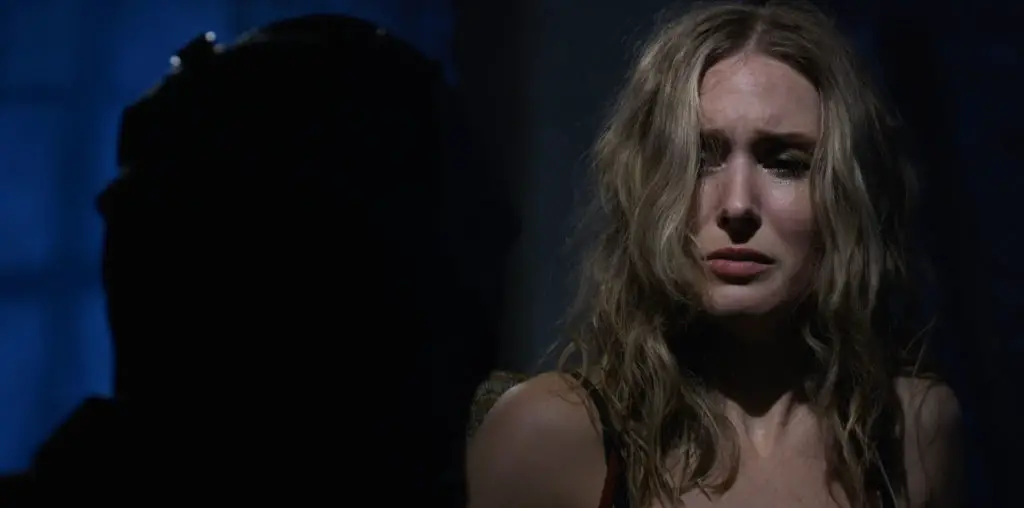
Lowave video, the DVD label that specializes in experimental film and video, has undertaken an ambitious series of discs which are grouped by various human passions such as Fear and Desire. The series is called “Human Frames,” and the DVD entitled “Fanaticism” provides an interesting assortment of short pieces which explore the effects of rigid state ideologies and mob action. Like all Lowave discs, the DVD is well packaged, with subtitles in English, French and German, and a helpful booklet with information about the included artists.
Two different films by Turkish artists, Hatice Güleryüz’s “The First Ones” and Köken Ergun’s “I, Soldier,” explore the indoctrinating effects of mass rallies and spectacles in Turkish society. In “I, Soldier,” Ergun uses a split screen format to present two views of a militaristic gymnastics demonstration in a stadium. On one side an officer screams out a ludicrous paean to soldier-hood for the cheering crowd, and on the other side we see an actual soldier at the event, scanning the horizon for potential trouble. By focusing on one individual in the midst of a mass spectacle, Ergun encourages us to imagine the mind of a person who has been brainwashed and indoctrinated. What must it be like to have so many mental barriers, blocking off errant thoughts? In the second half of the film, young men perform gymnastic feats to a hip hop beat with Turkish lyrics (not translated in the subtitles). It is startling how a musical style which began as a rebellious assertion of individual identity can be appropriated to this spectacle of conformity.
Other films include “Mighty Ballistic,” which documents a performance event where Josephine Turalba walks through the streets and shopping malls of Manila, wearing an elaborate dress and headpiece made from bullets, and Chulayarnnon Siriphol’s haunting “A Brief History of Memory,” in which we hear a voice-over narration of a woman whose son is killed by gangs of “red shirts” in the 2010 protests. It is a heartbreaking story. The black and white imagery of the film is a collage of scenes from a modest Thai neighborhood, overlaid with beautiful collages of flowers, spinning spheres, and insects. The mother’s story reveals how her religious beliefs in an afterlife are a great comfort to her, and the imagery hints at a connection between daily life and another, spiritual realm.
In “Even if she had been a criminal…” Jean-Gabriel Périot presents a fantastically sped-up version of WWII using archival footage, and then goes on to show us startling footage of crowds of Frenchmen during the Liberation, publicly humiliating women who had slept with Germans by shaving their heads. Many of the women’s faces show an impressive combination of stoicism, defiance, and shame. This completely extra-legal form of punishment puts a chilling face on the prospects for democracy in the Fourth Republic.
Sarnath Banerjee’s “Sophistication” is a cheerfully polemical history lesson about the fall of Moorish Spain, using simple, effective cartoon illustrations. A different kind of polemic is seen in Christoph Draeger’s “Helenés: Apparition of Freedom,” with footage that Draeger says comes from an Hungarian educational film, showing rescue workers putting out fires and saving victims in the apocalyptic landscape of a burning city after a nuclear attack. The English subtitles to the droning narration are taken from President George W. Bush’s second inaugural address: a bizarre patchwork of recycled Cold War rhetoric which tries to justify US world domination in the name of “freedom.” The ironic contrast between this obviously empty rhetoric and the hellish, destructive reality of the US invasions and occupations of Iraq and Afghanistan is labored and obvious in the extreme, but the film provides an interesting chance to see this strange footage, where both the rescuers and the victims are white Europeans dressed like college kids from the 1970s.
Every piece in this collection contributes an interesting point of view. Taken collectively, they show how artists’ voices can throw light on ideologically deadlocked situations where polemics and speeches often prove futile.

